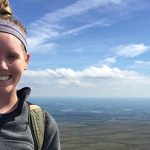
Growing up in Dallas, Texas didn’t afford senior natural resources student Blair Ruffing many opportunities to get outside. In high school, her mother took her on trips to the Mountain west of the U.S. and Canada, and while visiting snow-capped mountains and crystal clear streams, the potential to live, play and work outside became real to her.
“I didn’t apply to any colleges in Texas because I knew it was time to get out of the state. I ended up at Oregon State because of the top-ranked forestry program. As an added bonus, we have forests, mountains and the ocean practically in our back yard.”
Ruffing was drawn to natural resources and developed her own individualized specialty which she named soil resource economics.
“I got excited about soils while taking the required natural resources major’s introduction to the subject,” Ruffing says.
“The idea of soil just clicked with me,” Ruffing says. “It made me realize that everything starts in the ground. Without soil, we don’t have anything above ground, and we don’t have life.”
Because of her passion for soils and natural resources, Ruffing has become involved in student life at Oregon State. She works two jobs: one as a high ropes course technician at the Adventure Leadership Institute’s challenge course and another as a communications student worker at the OSU College of Forestry Research Forests. She participated in the women’s varsity rowing team during her first year at Oregon State and is the president of the Natural Resources Club.
“The club existed before I got here, but it wasn’t very active,” Ruffing explains. “We’re still trying to find our ground and decide where to focus our efforts, but I think it’s important to have a club that explores the broader subject of natural resources. I’m excited to see what it turns into.”
Ruffing also completed an internship abroad, in Ireland in 2016.
“I got to work on an organic farm at a Tibetan Buddhist Center,” Ruffing says. “It was the highlight of my college career so far, and probably the weirdest thing I’ve ever done.”
Ruffing says working on the organic farm helped her think about the way she can apply the principles she’s learned in the classroom so far.
“I want to use my soil science background and my experiences working in organic farming and combine them in a way to help with the food culture in our world,” Ruffing says.
After she graduates from Oregon State, Ruffing hopes to pursue graduate school in Ireland and serve in the Peace Corps.
“I’m not exactly sure what the future holds for me long-term,” Ruffing says, “but I know I want to do real on-the-ground work to make this world a better place.”

